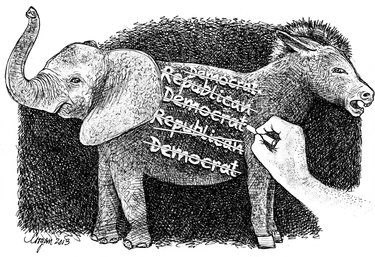If parties don't matter, choices still do
The better part of this week’s edition and last week’s edition of The Enterprise is given over to candidate profiles. We won’t tell our readers how to vote. We believe you are intelligent enough to know your own minds and make your own choices.
What we will do is isolate issues we believe are important to each of the towns we cover and give candidates a chance to state their views on those issues. You can see which views are aligned with your own. Residents of Guilderland, Berne, and Knox have choices in most if not all of the town posts.
We’ve even included profiles and issues-based interviews with candidates who have no opponents.
Why?
Because they are still part of the election process. Citizens deserve to know where they stand. And, airing views on important issues can move a community forward.
We’re troubled that two of the towns we cover, New Scotland and Westerlo, have slates of Democrats running unopposed. Voters deserve a choice.
In New Scotland, the citizen outpouring against a proposed mega-mall left the Republicans who didn’t want a size cap tattered. In Westerlo, where Democrats outnumber Republicans by nearly 2 to 1, the Democrats have dominated for decades, and the Republicans have simply given up.
“The town’s in such bad shape, it’s turned a lot of people off,” said the chairman of the Republican party, Clinton “Jack” Milner. His family has farmed in Westerlo for generations. He was elected to the town board once, but then defeated. He tried hard to bring about some worthwhile changes.
“Let the people who screwed it up straighten it out,” Milner said this week. Such bitterness serves no one.
In recent years, we’ve frequently heard citizens and candidates make comments like those made this week by Gerald Wood, who is running for a seat on the town board in Rensselaerville: “This is a small town,” he said, “and I feel that, out here, you vote for an individual who you feel is going to do the job. The parties…don’t mean a lot out here.”
There is some truth to this, particularly in a small town where an individual may be well known and respected, garnering votes from all sides. Take, for example, Kenneth Mackey in Westerlo. A life-long Democrat, he wanted to be a judge. His party didn’t back him, so he ran in 2009 on the GOP line.
He was well known in town having volunteered for decades on the ambulance squad and the fire department. Although the Republicans are vastly outnumbered, he won on their line. This year, he’s running as a Democrat.
But the way the American political system works, as opposed to the democracies in many European nations, is to have two clear choices. When you vote for one party’s candidate, you have a fair idea of what you’ll be getting although you may not agree with everything about that candidate.
In a coalition government, you can vote for a small-party candidate that matches your beliefs but have no assurance that those beliefs will be acted upon.
The beauty of a two-party system, when it works well, is that each party offers a clear view and, depending on the power structure, can make sensible compromises that serve the public good.
Problems arise, as they have on the national political stage, when there is no respect for the law that has been passed and no will to compromise in the first place.
“It’s not about national politics here,” said William Bichteman, a Democrat running unopposed to keep his council seat in Westerlo. “The town’s too small. It’s about doing what has to be done for the town.”
Locally, we like the philosophy espoused by the Westerlo highway superintendent. “I don’t work just for the Democrats,” said Keith Wright. “I work for everybody. I don’t work for the party; I feel I work for the people.”
But how do you get there?
The best way is by running against opponents that openly state their views, allowing the public a real choice.
“I feel like party lines have become meshed together in this town,” said Heather Kelly, the deputy clerk in Rensselaerville, who has launched a write-in campaign for clerk since losing the Democratic nomination. “It’s apparent candidates can flip-flop from one party to another. Nobody seems to be expressing their true beliefs as far as politics go,” she said of the cross endorsements of some Rensselaerville candidates.
John Kudlack, a Rensselaerville town councilman and chair of the Democratic committee, put it more succinctly. He said of the cross endorsements, “It’s a conflict of politics.”
Another Democrat, Jeanette Rice, who is making her first run for a Rensselaerville Town board seat, asked, “Where’s the choice?”
Clearly defined choices are the heart of America’s democracy. The heart is what pumps the life blood into the body politic.
The disgruntled GOP chairman in Westerlo also said, “I’m just hoping hardly anyone shows to vote; that will show the level of disgust.”
Our hope is just the opposite. We hope our readers will make a fine meal of the bounty laid before them in this edition, digest the facts and the varied solutions offered to problems, and go to the polls in droves.
Remember the places where people are literally dying for the right to vote, to shape their future, and use that resolve to create choices for the unfolding future.
— Melissa Hale-Spencer


